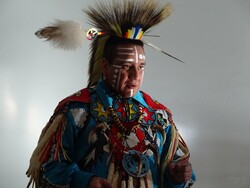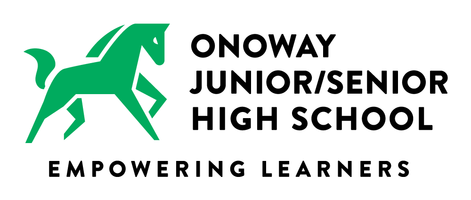Culture Sharing at OJSH

Over the past year, OJSH has had many guests coming into our school to speak to our students about a variety of topics. March 12th and 13th , however, were especially interesting and valuable for students at OJSH because of two guest speakers. Mrs. Tracey Noyes, OJSH Indigenous Liaison, contacted and made the arrangements for the guests to present to students, classes and staff.
On March 12th, Francis Alexis, an Elder from Nakota Sioux Nation, explained to Mrs. Elliott’s Math 10 how math, science and the Medicine Wheel are intertwined. The number ‘9’ is a significant number to First Nations people. First, Francis related the Medicine Wheel and its components to our traditional directions of north, south, east and west and showed that this was 360 degrees of a circle. Then he explained how the circle was divisible by 90, by 45 and all the way down to 9 through the components of the Wheel. He also discussed the additional two directions - the Creator and Mother Earth – and explained how the Medicine Wheel was a concept in 3D. Francis discussed other shapes found in the Medicine Wheel -the triangle and the square - and then explained how these shapes within the Wheel related to a Cartesian plane.
Throughout the lesson, Mr. Alexis showed what a great storyteller he was. He shared some of his own personal stories from his childhood, and what life was like for him. He related legends from the Medicine Wheel such as the creation of man, and how lightning and thunder were from the Thunderbird as well as other stories passed down from generation to generation.
On March 13th, traditional dancer, story teller and role model, Adrian LaChance spent the entire day at OJSH talking and interacting with as many students and classes as possible. All students from Grade 8 to Grade 12 had, at one point during the day, the opportunity to hear Mr. LaChance speak. Although the day was long, Adrian wore his traditional warrior regalia, headgear and face paint for each of his presentations. Adrian noted that much of the intricate sewing on his regalia, he did himself - a skill passed down to him from his mother.
Adrian is a Plains Cree originally from James Smith Cree Nation located near Prince Albert, Saskatchewan. He now makes his home in Edmonton. Adrian has travelled across Canada, the US and overseas talking about and sharing the Cree culture. He uses traditional teachings and customs to bring about spiritual awareness and to build positive relationships among all peoples.
Adrian Lachance was exposed to all types of abuse at an early age and he often ended up in foster care or group care. His time in care was not a positive experience as he experienced beatings and verbal, racist abuse. As he grew older, Adrian became involved with crime, gangs, drugs and alcohol. Living life on the streets, he became a junkie at the age of 14. He was eventually arrested for drug possession and trafficking cocaine and a new cycle began - in and out of jail. However, it was in jail that Adrian was introduced to native culture and he began to listen to the words from the elders. After close to ten years in the federal system, Adrian began to work with the elders, truly trying to understand the gift of forgiveness and to begin his healing journey.
At age 47, Adrian has been drug and alcohol free for 23 and a half years. He has made it his mission to talk to youth about forgiveness and sharing, and he uses humour and cultural awareness as a way to bring people together. Adrian also credits traditional dancing as saving his life. For him, dancing and drumming has helped him to heal. He has been a Grand Champion dancer since 2002.
As Adrian spoke to OJSH students, he told how and why the residential school system had such a detrimental effect on First Nations people. He explained that the historical trauma of residential school continues to have generational repercussions. Adrian talked of reconciliation and explained that the process will take many, many years but that we will be much better for it. He talked of the disrespect of cultural appropriation and the necessity of showing respect and appreciation for other cultures. Throughout the day, Adrian spoke with humour and kindness, respect and acceptance. He challenged students by saying: “What can you do to make a better place? Each one of you has an opportunity to make Canada a more kind and loving place. It starts with dialogue.” At the end of the school day, Adrian talked to students in the gym instead of a classroom. Finally, he brought his day at OJSH to a close by performing for students one of his traditional dances.
Principal Lobo commenting on the visits said, “It’s fantastic to have members of the First Nations community share their experiences and cultures with our staff and students
.
